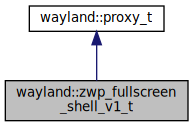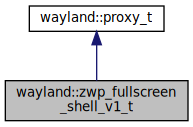displays a single surface per output More...
#include <wayland-client-protocol-unstable.hpp>


Public Types | |
| enum | wrapper_type { wrapper_type::standard, wrapper_type::display, wrapper_type::foreign, wrapper_type::proxy_wrapper } |
Public Member Functions | |
| void | release () |
| release the wl_fullscreen_shell interface More... | |
| void | present_surface (surface_t surface, zwp_fullscreen_shell_v1_present_method method, output_t output) |
| present surface for display More... | |
| zwp_fullscreen_shell_mode_feedback_v1_t | present_surface_for_mode (surface_t surface, output_t output, int32_t framerate) |
| present surface for display at a particular mode More... | |
| std::function< void(zwp_fullscreen_shell_v1_capability)> & | on_capability () |
| advertises a capability of the compositor More... | |
| uint32_t | get_id () const |
| Get the id of a proxy object. More... | |
| std::string | get_class () const |
| Get the interface name (class) of a proxy object. More... | |
| uint32_t | get_version () const |
| Get the protocol object version of a proxy object. More... | |
| wrapper_type | get_wrapper_type () const |
| Get the type of a proxy object. More... | |
| void | set_queue (event_queue_t queue) |
| Assign a proxy to an event queue. More... | |
| wl_proxy * | c_ptr () const |
| Get a pointer to the underlying C struct. More... | |
| bool | proxy_has_object () const |
| Check whether this wrapper actually wraps an object. More... | |
| operator bool () const | |
| Check whether this wrapper actually wraps an object. More... | |
| bool | operator== (const proxy_t &right) const |
| Check whether two wrappers refer to the same object. More... | |
| bool | operator!= (const proxy_t &right) const |
| Check whether two wrappers refer to different objects. More... | |
| void | proxy_release () |
| Release the wrapped object (if any), making this an empty wrapper. More... | |
Static Public Attributes | |
| static constexpr std::uint32_t | release_since_version = 1 |
| Minimum protocol version required for the release function. More... | |
| static constexpr std::uint32_t | present_surface_since_version = 1 |
| Minimum protocol version required for the present_surface function. More... | |
| static constexpr std::uint32_t | present_surface_for_mode_since_version = 1 |
| Minimum protocol version required for the present_surface_for_mode function. More... | |
Detailed Description
displays a single surface per output
Displays a single surface per output.
This interface provides a mechanism for a single client to display simple full-screen surfaces. While there technically may be multiple clients bound to this interface, only one of those clients should be shown at a time.
To present a surface, the client uses either the present_surface or present_surface_for_mode requests. Presenting a surface takes effect on the next wl_surface.commit. See the individual requests for details about scaling and mode switches.
The client can have at most one surface per output at any time. Requesting a surface to be presented on an output that already has a surface replaces the previously presented surface. Presenting a null surface removes its content and effectively disables the output. Exactly what happens when an output is "disabled" is compositor-specific. The same surface may be presented on multiple outputs simultaneously.
Once a surface is presented on an output, it stays on that output until either the client removes it or the compositor destroys the output. This way, the client can update the output's contents by simply attaching a new buffer.
Warning! The protocol described in this file is experimental and backward incompatible changes may be made. Backward compatible changes may be added together with the corresponding interface version bump. Backward incompatible changes are done by bumping the version number in the protocol and interface names and resetting the interface version. Once the protocol is to be declared stable, the 'z' prefix and the version number in the protocol and interface names are removed and the interface version number is reset.
Definition at line 289 of file wayland-client-protocol-unstable.hpp.
Member Enumeration Documentation
◆ wrapper_type
|
stronginherited |
Underlying wl_proxy type and properties of a proxy_t that affect construction, destruction, and event handling
| Enumerator | |
|---|---|
| standard | C pointer is a standard type compatible with wl_proxy*. Events are dispatched and it is destructed when the proxy_t is destructed. User data is set. |
| display | C pointer is a wl_display*. No events are dispatched, wl_display_disconnect is called when the proxy_t is destructed. User data is set. |
| foreign | C pointer is a standard type compatible with wl_proxy*, but another library owns it and it should not be touched in a way that could affect the operation of the other library. No events are dispatched, wl_proxy_destroy is not called when the proxy_t is destructed, user data is not touched. Consequently, there is no reference counting for the proxy_t. Lifetime of such wrappers should preferably be short to minimize the chance that the owning library decides to destroy the wl_proxy. |
| proxy_wrapper | C pointer is a wl_proxy* that was constructed with wl_proxy_create_wrapper. No events are dispatched, wl_proxy_wrapper_destroy is called when the proxy_t is destroyed. Reference counting is active. A reference to the proxy_t creating this proxy wrapper is held to extend its lifetime until after the proxy wrapper is destroyed. |
Definition at line 105 of file wayland-client.hpp.
Member Function Documentation
◆ c_ptr()
|
inherited |
Get a pointer to the underlying C struct.
- Returns
- The underlying wl_proxy wrapped by this proxy_t if it exists, otherwise an exception is thrown
◆ get_class()
|
inherited |
Get the interface name (class) of a proxy object.
- Returns
- The interface name of the object associated with the proxy
◆ get_id()
|
inherited |
◆ get_version()
|
inherited |
Get the protocol object version of a proxy object.
Gets the protocol object version of a proxy object, or 0 if the proxy was created with unversioned API.
A returned value of 0 means that no version information is available, so the caller must make safe assumptions about the object's real version.
display_t will always return version 0.
- Returns
- The protocol object version of the proxy or 0
◆ get_wrapper_type()
|
inlineinherited |
Get the type of a proxy object.
Definition at line 288 of file wayland-client.hpp.
◆ on_capability()
| std::function< void(zwp_fullscreen_shell_v1_capability)> & zwp_fullscreen_shell_v1_t::on_capability | ( | ) |
advertises a capability of the compositor
- Parameters
-
capabilty
Advertises a single capability of the compositor.
When the wl_fullscreen_shell interface is bound, this event is emitted once for each capability advertised. Valid capabilities are given by the wl_fullscreen_shell.capability enum. If clients want to take advantage of any of these capabilities, they should use a wl_display.sync request immediately after binding to ensure that they receive all the capability events.
Definition at line 3994 of file wayland-client-protocol-unstable.cpp.
◆ operator bool()
|
inherited |
Check whether this wrapper actually wraps an object.
- Returns
- true if there is an underlying object, false if this wrapper is empty
◆ operator!=()
|
inherited |
Check whether two wrappers refer to different objects.
◆ operator==()
|
inherited |
Check whether two wrappers refer to the same object.
◆ present_surface()
| void zwp_fullscreen_shell_v1_t::present_surface | ( | surface_t | surface, |
| zwp_fullscreen_shell_v1_present_method | method, | ||
| output_t | output | ||
| ) |
present surface for display
- Parameters
-
surface method output
Present a surface on the given output.
If the output is null, the compositor will present the surface on whatever display (or displays) it thinks best. In particular, this may replace any or all surfaces currently presented so it should not be used in combination with placing surfaces on specific outputs.
The method parameter is a hint to the compositor for how the surface is to be presented. In particular, it tells the compositor how to handle a size mismatch between the presented surface and the output. The compositor is free to ignore this parameter.
The "zoom", "zoom_crop", and "stretch" methods imply a scaling operation on the surface. This will override any kind of output scaling, so the buffer_scale property of the surface is effectively ignored.
Definition at line 3983 of file wayland-client-protocol-unstable.cpp.
◆ present_surface_for_mode()
| zwp_fullscreen_shell_mode_feedback_v1_t zwp_fullscreen_shell_v1_t::present_surface_for_mode | ( | surface_t | surface, |
| output_t | output, | ||
| int32_t | framerate | ||
| ) |
present surface for display at a particular mode
- Parameters
-
surface output framerate
Presents a surface on the given output for a particular mode.
If the current size of the output differs from that of the surface, the compositor will attempt to change the size of the output to match the surface. The result of the mode-switch operation will be returned via the provided wl_fullscreen_shell_mode_feedback object.
If the current output mode matches the one requested or if the compositor successfully switches the mode to match the surface, then the mode_successful event will be sent and the output will contain the contents of the given surface. If the compositor cannot match the output size to the surface size, the mode_failed will be sent and the output will contain the contents of the previously presented surface (if any). If another surface is presented on the given output before either of these has a chance to happen, the present_cancelled event will be sent.
Due to race conditions and other issues unknown to the client, no mode-switch operation is guaranteed to succeed. However, if the mode is one advertised by wl_output.mode or if the compositor advertises the ARBITRARY_MODES capability, then the client should expect that the mode-switch operation will usually succeed.
If the size of the presented surface changes, the resulting output is undefined. The compositor may attempt to change the output mode to compensate. However, there is no guarantee that a suitable mode will be found and the client has no way to be notified of success or failure.
The framerate parameter specifies the desired framerate for the output in mHz. The compositor is free to ignore this parameter. A value of 0 indicates that the client has no preference.
If the value of wl_output.scale differs from wl_surface.buffer_scale, then the compositor may choose a mode that matches either the buffer size or the surface size. In either case, the surface will fill the output.
Definition at line 3988 of file wayland-client-protocol-unstable.cpp.
◆ proxy_has_object()
|
inherited |
Check whether this wrapper actually wraps an object.
- Returns
- true if there is an underlying object, false if this wrapper is empty
◆ proxy_release()
|
inherited |
Release the wrapped object (if any), making this an empty wrapper.
Note that display_t instances cannot be released this way. Attempts to do so are ignored.
- Examples
- foreign_display.cpp.
◆ release()
| void zwp_fullscreen_shell_v1_t::release | ( | ) |
release the wl_fullscreen_shell interface
Release the binding from the wl_fullscreen_shell interface.
This destroys the server-side object and frees this binding. If the client binds to wl_fullscreen_shell multiple times, it may wish to free some of those bindings.
Definition at line 3978 of file wayland-client-protocol-unstable.cpp.
◆ set_queue()
|
inherited |
Assign a proxy to an event queue.
- Parameters
-
queue The event queue that will handle this proxy
Assign proxy to event queue. Events coming from proxy will be queued in queue instead of the display's main queue.
See also: display_t::dispatch_queue().
- Examples
- proxy_wrapper.cpp.
Member Data Documentation
◆ present_surface_for_mode_since_version
|
staticconstexpr |
Minimum protocol version required for the present_surface_for_mode function.
Definition at line 405 of file wayland-client-protocol-unstable.hpp.
◆ present_surface_since_version
|
staticconstexpr |
Minimum protocol version required for the present_surface function.
Definition at line 355 of file wayland-client-protocol-unstable.hpp.
◆ release_since_version
|
staticconstexpr |
Minimum protocol version required for the release function.
Definition at line 325 of file wayland-client-protocol-unstable.hpp.
The documentation for this class was generated from the following files:
